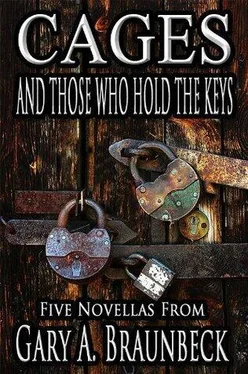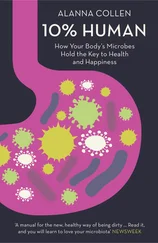Dobbs pressed the button, stood waiting for a moment, then shook his head and said, “Shit, I forgot, come on.” He started walking toward one of the parking garage doors that led into the lobby. “We have to get the elevator key from whoever’s manning the front desk.”
A set of glass doors opened into a warmly-lighted hallway with gold carpeting. On the walls hung bulletin boards with announcements and fliers tacked on them—Bingo Night, a pot-luck dinner at a local church, a lecture on living wills to be given at the library next week—as well as tastefully-framed prints of bowls of fruit, glamorous cityscapes, and myriad pastoral scenes. The furniture was clean and over-stuffed, the sofa pillows fluffy, the doilies and afghans perfectly folded and arranged, the whole setting designed to make you feel Right At Home. Smells of soup, cornbread, and meatloaf wafted from the cafeteria ( The Maples Dining Room, as it was called by the sign), and the murmuring of the voices coming from the dining area suggested that it was filled with people who’d known each other for decades and could easily fall into the kind of familiar, friendly conversation that, between lifelong friends, becomes a kind of art unto itself.
Despite my increasing anxiety over what Fred and I were about to do, I slowed down, chancing a glance into the dining room, then stopped in my tracks entirely when I saw how everyone was dressed; the women wore either dresses or attractive suit outfits, while all the men were in slacks, jackets, and ties. I looked around, trying to see if there were anything posted about a dress code, and then just as quickly realized there wouldn’t be. This dining room was filled with people who remembered what it was like to treat mealtime as an event, every day. You dressed for meals not only out of respect for yourself, but for those with whom you would share the meal. Looking at the diners at that moment, I found myself wondering when, how, and why we’d come to view what was meant to be a sociable event of the day as just another excuse to grab some chow. Me, I frequently ate alone while wearing only my underwear, and the last time I’d had a dinner date, I’d worn khakis and a polo shirt, while my date arrived resplendent in her jeans, sandals, and OSU sweatshirt. Maybe we think it’s too old-fashioned or outright corny to dress like this for meals every day, but I’d’ve bet a week’s salary that every person in there had spent a lot of time deciding what to wear, then just as much time getting ready, and were probably enjoying their meal more than we of the jeans-and-T-shirted pizza nights could or would ever understand.
Somebody has to come up with these commonplace profundities. Might as well be me.
I smiled at an old woman who looked up and saw me looming in the doorway, then double-timed it to catch up with Dobbs, who was speaking to the receptionist at the front desk.
“…moved in about seven months ago,” the woman was saying, “and in all that time I don’t remember her ever having a single visitor.”
Dobbs gave his head a slow, sad shake. “That’s terrible,” he said, sounding like he meant it.
“One of the things we try to do here at The Maples is make sure that none of our residents feel isolated—it’s a terrible thing to be getting on in years and feel alone and lonely. We encourage everyone to interact with their neighbors—you know, sort of keep an eye on each other’s well-being so that no one feels ignored or forgotten…but Miss Driscoll never really allowed herself to become part of The Maples’ community. Oh, she’d be pleasant enough at meals and come to the weekly residents’ meetings, but aside from those times, she rarely left her room.”
Fred put on his stroke-face again, considering this. “And she never had any visitors?”
The woman behind the desk shook her head. “Not unless you count delivery people. And the thing is, she has— had —one of our bigger apartments. People who can afford anything on 7 or above are, well… comfortable , you know? They’ve been careful with their money. And—oh, God, this is going to sound so mean—our older residents who have a little money, they tend to get visitors. You know—family and friends who want to be left a little something in the will. Not to imply that they don’t love their grandma or grandpa or great aunt or whoever, but…oh, my; I’m really putting my foot in it here, aren’t I?”
“Not particularly,” said Dobbs.
The woman shook her head. “But not Miss Driscoll. Never a visitor, just the deliveries. I’ll bet she had two, three packages a week delivered to her. And some of those packages were fairly sizeable. On days when she had deliveries, she never came down for meals, just called the desk and said she wasn’t feeling well and could she have her meals sent to her room. We do that here, send meals to a resident’s room if they’re not feeling good enough to come down.”
“So she’d sometimes miss, what—three meals a week?”
“More, if it was a big delivery day.”
I couldn’t help but wonder why Dobbs was asking all these questions, unless it had something to do with what he’d told me about treating the dead with respect; maybe asking questions gave him some sense of what kind of person they had been while alive, and helped him decide how best to treat their remains. And maybe he was just a good, old-fashioned, first-class nib-shit. The woman behind the desk gave the freight elevator key to Dobbs. “Your gurney doesn’t squeak, does it?” “No, ma’am, it certainly does not.”
She nodded her head. “That’s good. I wouldn’t want the other residents to be disturbed by this—at least, not any more than they already have been.”
Dobbs thanked her for the key, turned to leave, then looked back. “You don’t by chance know who called this in, do you?”
“I know it wasn’t me, I just came on-duty a couple of hours ago, but…wait a second, please, I’ll check the phone log.” She called up something on her computer. “We have to keep records of who makes this kind of call, and when, all that good stuff.” She found was she was looking for, scrolled up, then down, then said, “Huh.”
“Something wrong?” asked Dobbs.
“There’s nothing here. If the call had been made from this desk or the manager’s office, it would be entered in the phone records. But…there’s nothing.”
“So maybe it was one of her neighbors?”
“Let me check.” She called up another file, then another, then one more. “Okay, this is odd.”
Dobbs gave me a quick look, then went back to the desk. “You’re not gonna actually make me ask , are you?”
The woman looked at him, then back at the computer screen as if she expected the information she’d been searching for to have suddenly appeared during the interim. “We have certain rules that all our residents abide by, and one of those rules is that in a situation like this, if they make the call to the police, they are to immediately inform us so that we can enter it into the records. When a resident passes away on the premises, it’s vital that we record every bit of information—not just for the family’s peace of mind, but to protect ourselves should any legal questions arise.” She looked back at Dobbs. “There’s nothing here about Miss Driscoll’s dying—and I mean nothing .” Her eyes narrowed. “This is lazy and thoughtless and inexcusable. We could get into a lot of trouble for this.”
“I won’t say anything,” said Dobbs. “But it looks like maybe this’d be a good time for you to enter some information, huh?”
“I…I don’t know any of the specifics, I wouldn’t know where—”
Dobbs handed her a photocopy of the forms given to him by the Coroner’s Office. “Most everything’s there; when we got the call, when the doc arrived here, the estimated time of death, the doc’s official conclusion, all of it.” She took the forms from him. “Do you always carry extra copies of this stuff?” “All the time. You’d be surprised how many people forget to write this stuff down when someone dies.” She pressed the forms against her chest and sighed with relief. “You’re a life-saver, you know that?” “All part of my famous curmudgeonly charm.” And with a wave, he left, gesturing me to follow. “Why all the questions?” I asked him as we re-entered the parking garage.
Читать дальше












